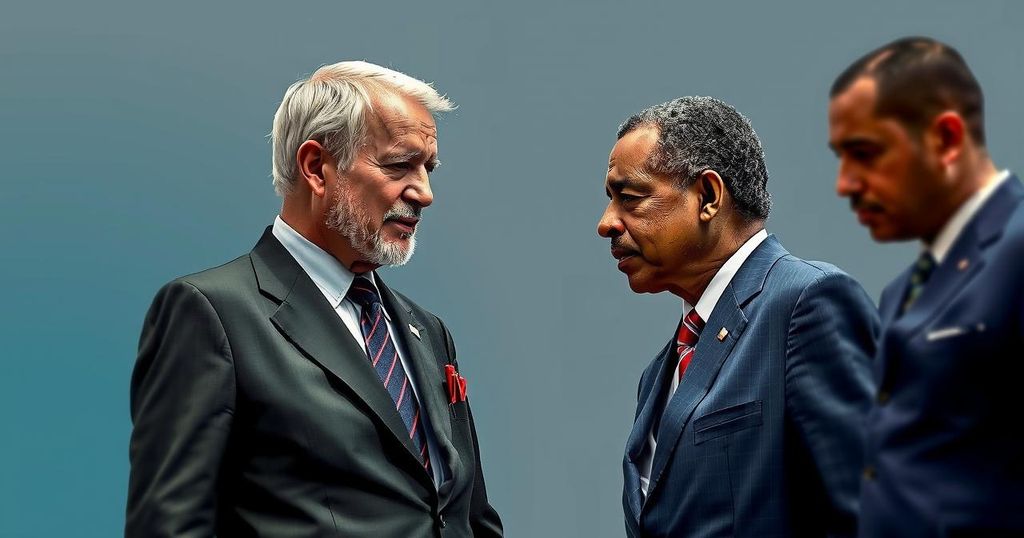Global news
AFRICA, AFRICA PROGRAMME, ALEX VINES, ANGOLA, ATLANTIC OCEAN, BBC, BID, BIDEN, CHATHAM HOUSE, DEMOCRATIC REPUBLIC OF CONGO, DEVELOPMENT, DONALD TRUMP, EUROPE/ASIA, INFRASTRUCTURE PROJECTS, INTERNATIONAL RELATIONS, INVESTMENT PROMOTION AUTHORITY, IPA, JOE BIDEN, LOBITO, REGIONAL DEVELOPMENT, RUSSIA, TRADE RELATIONS, WASHINGTON DC
Marcus Li
0 Comments
Biden’s Visit to Angola: A Strategic Step in U.S.-Africa Relations
Joe Biden’s inaugural visit to Africa as U.S. President focuses on Angola, emphasizing U.S. investment and trade as a counter to Chinese influence, specifically through the Lobito Corridor project. This railway initiative aims to connect mineral resources in the DRC and Zambia to Angola’s Lobito port, bolstering economic ties and showcasing subsequent shifts in foreign policy by Angola’s leadership. Amidst uncertainties of the Trump presidency, this visit aims to solidify Angola’s place in a new era of U.S.-African relations.
President Joe Biden is embarking on his inaugural visit to Africa as the President of the United States, specifically targeting Angola, a nation rich in oil and minerals. The visit not only seeks to reinforce U.S. commitment to enhancing trade and investing in infrastructure but also serves as a strategic maneuver to counter growing Chinese influence on the continent. Notably, Biden is the first sitting U.S. president to visit Angola, an action that reflects a significant thawing of relations between the two countries since former President Donald Trump is poised to take office in January.
The visit is significant as it underscores a shift in Angola’s foreign policy under President João Lourenço, who has pivoted the country away from its historical alignment with China and Russia toward a more pragmatic relationship with the U.S. The centerpiece of Biden’s visit is the launch of the Lobito Corridor project, a 1,344-kilometer railway initiative designed to connect mineral-rich regions in the Democratic Republic of the Congo and Zambia to Angola’s Lobito port on the Atlantic Ocean. This corridor is expected to facilitate the transport of essential minerals like lithium and cobalt, critical for electric vehicle batteries, from Africa to international markets.
Amidst political uncertainties surrounding the upcoming Trump administration, Angola’s President Lourenço expressed optimism that the collaborative investment in the Lobito Corridor would continue, indicating a readiness to work with any leadership. The initiative is a partnership involving the U.S., G7 nations, and private investors, reflecting a broader commitment of approximately $600 billion toward fostering global support up to 2027. While concerns about potential resource exploitation echo colonial undertones, Lourenço highlighted that these endeavors prioritize the interests of African countries, displaying a commitment to sustainable development.
Amidst the development, there are conjectures regarding the future of raw material exports from Africa, with some nations contemplating policies favoring local processing. Despite the cyclical nature of lithium and cobalt demand, the steady global appetite for copper from the DRC and Zambia bodes well for the Lobito Corridor’s effectiveness. Furthermore, with China’s historical influence in the region evidenced by its substantial investment in infrastructure through the Belt and Road Initiative, the U.S. approach aims to present a balanced, multipolar strategy that maintains competitive pressure on Beijing’s presence in Africa.
Biden’s visit fulfills commitments made to the continent in 2022, providing Angola with a platform to enhance its stature in global trade dynamics, despite potential uncertainties looming ahead with changing U.S. administrations.
President Biden’s upcoming visit to Angola is set against the backdrop of ongoing strategic competition between the U.S. and China in Africa, where both nations vie for influence and trade partnerships. Angola, rich in natural resources, has historically been allied with China and Russia but has sought more engagement with the U.S. recently. President João Lourenço’s administration signifies this shift toward more pragmatic, multipolar foreign relations. The Lobito Corridor railway project is a focal point for increased U.S. investment in Africa, showcasing Biden’s intent to reshape U.S. engagement on the continent as a counterbalance to China’s extensive Belt and Road Initiative, which has faced criticism for leading countries into unsustainable debt.
Ultimately, President Joe Biden’s visit to Angola marks a noteworthy attempt to revitalize U.S.-Africa relations by emphasizing investment and trade partnerships through initiatives like the Lobito Corridor. As global demand for key minerals rises, Angola’s strategic geographical position offers substantial opportunities for economic growth and collaboration. The developments during this visit may significantly shape the future of regional trade and geopolitical positioning amidst ongoing U.S.-China rivalry, with implications for both diplomatic relations and economic strategies for years to come.
Original Source: www.bbc.com




Post Comment